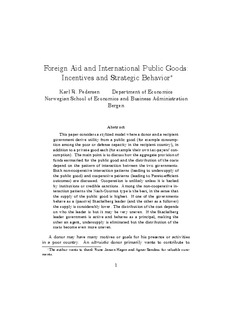Foreign aid and international public goods : incentives and strategic behavior
Working paper
Permanent lenke
http://hdl.handle.net/11250/162816Utgivelsesdato
2002-08Metadata
Vis full innførselSamlinger
- Discussion papers (SAM) [657]
Sammendrag
This paper considers a stylized model where a donor and a recipient
government derive utility from a public good (for example consumption
among the poor or defense capacity in the recipient country), in
addition to a private good each (for example their own tax-payers’ consumption).
The main point is to discuss how the aggregate provision of
funds earmarked for the public good and the distribution of the costs
depend on the pattern of interaction between the two governments.
Both non-cooperative interaction patterns (leading to undersupply of
the public good) and cooperative patterns (leading to Pareto-efficient
outcomes) are discussed. Cooperation is unlikely unless it is backed
by institutions or credible sanctions. Among the non-cooperative interaction
patterns the Nash-Cournot type is the best, in the sense that
the supply of the public good is highest. If one of the governments
behave as a (passive) Stackelberg leader (and the other as a follower)
the supply is considerably lower. The distribution of the cost depends
on who the leader is but it may be very uneven. If the Stackelberg
leader government is active and behaves as a principal, making the
other an agent, undersupply is eliminated but the distribution of the costs become even more uneven.
Utgiver
Norwegian School of Economics and Business Administration. Department of EconomicsSerie
Discussion paper2002:17
